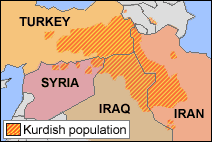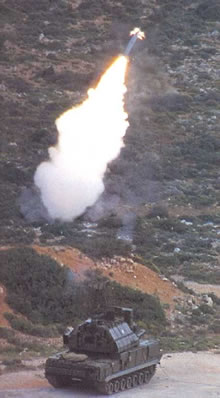Why hasn't the Iran war started yet ?
Dave Kimble | 21.08.2006 09:06 | Analysis
If the US wanted an excuse to start attacking Iran, then they got it this week, when Iran fired shells into the Qandil Mountain area of northern Iraq, killing two Iraqis and wounding four.

Kurdish population map

Tor-M1 anti-missile tank
Why hasn't the Iran war started yet ?
by Dave Kimble at www.peakoil.org.au
21 August 2006If the US wanted an excuse to start attacking Iran, then they got it this week, when Iran fired shells into the Qandil Mountain area of northern Iraq, killing two Iraqis and wounding four.
The area is notionally controlled by the regional government of the Patriotic Union of Kurdistan and is recognised as being a stronghold of Turkish and Iranian Kurdish independence fighters.
And yet we are told [1] by Mustafa Sayed Qadir, a senior member of the PUK, that "The government of Iraq is aware of the shelling, which has taken place occasionally in recent months, but has not taken an official position."
OK, the central Iraqi Government is known to be friendly towards Tehran, but what about the PUK and the US - don't they mind either ? The Kurds are the closest allies of the US in Iraq, and an artillery attack on Kurdish territory is surely more provocative than taking two soldiers hostage, so why hasn't the war started yet? Not even a word of condemnation.
Perhaps Iran was banking on trotting out the same excuse as the Israelis have just used over their kidnapping of the Palestinian Deputy Prime Minister, Ismail Hamiye - they belong to a terrorist organisation, and are therefore fair game.
The Turkish Kurds have certainly put themselves into that category after committing the ultimate sin - blowing up the Ceyhan pipelines in eastern Turkey on 19 August, that brings oil and gas from the Caspian Sea states to the Mediterranean. [2]
Meanwhile the Iranians have demonstrated that they are on full alert and armed to the teeth by running war games in their south-eastern province of Sistan-Baluchistan, which borders Pakistan and southern Afghanistan. [3]
This choice of location is about as non-threatening a patch of territory as the Iranians have got, given that they are surrounded by states that are hosting US bases. Their message is clearly, 'look, we have all these fancy new weapons systems, and we are not afraid of you'.
The timing of these provocations cannot be ignored either, coming as they do just as Iran announces its response to UN Security Council demands for then to stop enriching uranium or face sanctions.
The full response is due on 22 August, but the influential cleric Ali Akbar Hashemi Rafsanjani is reported to have said during Friday prayers on 18 August, "We hope America has learned a lesson from the war in Lebanon and refrains from getting involved in another conflict and causing insecurity in our region."
And a Foreign Ministry spokesman further telegraphed the outcome in a media briefing on 20 August, saying "The issue of suspension means returning to the past. Suspension is not on our agenda."
Meanwhile back in Washington, a galaxy of former-Generals, Ambassadors, Professors and defense analysts have sent a open letter [4] to President Bush, calling on him to engage in direct talks with Iran without preconditions :
"We strongly caution against any consideration of the use of military force against Iran. The current crises must be resolved through diplomacy, not military action. An attack on Iran would have disastrous consequences for security in the region and U.S. forces in Iraq, and it would inflame hatred and violence in the Middle East and among Muslims elsewhere."
It surely cannot have escaped the notice of Washington that blitzkreig has not been a successful tactic against the deeply dug in forces of Hezbollah, and Iran's nuclear facilities are likely to be in much deeper bunkers.
Moreover, if Iran were to retaliate with a missile barrage against every neighbour that hosts US forces, as well as all the oil infrastructure there, then the entire Middle East would truly be in flames.
The logic of such a massive retaliatory attack is clear : US and Israeli air forces would be initially trying to take out all air-fields, missile batteries and radar installations, to take control of Iranian air-space, before turning their sights on the deep bunkers. Iran would therefore have to have its missiles programmed for 'launch on warning', so that they are not destroyed on the launch pad in the first strike.
US air strikes can be expected to come from all sides, so Iran must have a plan to retaliate against all sides.
Russia has announced it would supply Iran with its Tor-M1 anti-missile battle tanks, and when the US particularly asked them not to in April this year, Moscow flatly rebuffed the request. No one really knows how these systems will stand up in the heat of battle. This is going to make any air attack a difficult scenario to predict.
And can the Pentagon be sure Iran does not have French Exocet missiles, against which, according to this GAO report from 2000 [5], the Navy has "only limited capabilities" ?
Defense Acquisitions:
Comprehensive Strategy Needed to Improve Ship Cruise Missile Defense
(Letter Report, 07/11/2000, GAO/NSIAD-00-149).
Pursuant to a congressional request, GAO:
(1) assessed the Navy's progress since 1996 in improving the self-defense capability of surface ships against cruise missiles; and
(2) evaluated Navy plans for meeting future anti-cruise missile self-defense requirements.
GAO noted that: (1) although the Navy has made some progress in improving surface ship self-defense capabilities, most ships continue to have only limited capabilities against cruise missile threats;
....
And what ever happened to those suitcase nukes that went missing from the Soviet armoury in what is now the rebel Moldovian province of Transnystria ? Whoever got hold of some of those might be feeling like they have reason to act boldly.
Could it be that the US is not so keen to attack Iran after all ?
Has Hersch been set up to do the Pentagon's sabre-rattling for them,letting Bush be seen to be the good guy when he takes the diplomatic path ?
Why are we not at war yet ?
Dave Kimble
 e-mail:
Dave.Kimble@Lizzy.com.au
e-mail:
Dave.Kimble@Lizzy.com.au
 Homepage:
http://www.peakoil.org.au
Homepage:
http://www.peakoil.org.au
Comments
Display the following 5 comments